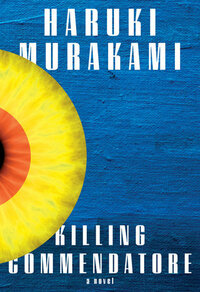You need to sign in or sign up before continuing.
Take a photo of a barcode or cover
adventurous
emotional
mysterious
reflective
Plot or Character Driven:
Character
Strong character development:
Yes
Loveable characters:
Yes
Diverse cast of characters:
Complicated
Flaws of characters a main focus:
Yes
#1
Another great book my Haruki Murakami. The writing in this book is so simple yet it delivers so much. He (along with his translator) does a great job of bringing you into the story.
The book gets a bit weird and if you like things that wrap up tightly then this is not a book for you.
The similarities between characters lives and how they react differently to similar situations is interesting.
The book gets a bit weird and if you like things that wrap up tightly then this is not a book for you.
The similarities between characters lives and how they react differently to similar situations is interesting.
challenging
dark
mysterious
slow-paced
Plot or Character Driven:
Character
Strong character development:
No
Loveable characters:
Yes
Diverse cast of characters:
No
Flaws of characters a main focus:
Yes
adventurous
challenging
dark
emotional
mysterious
tense
medium-paced
Plot or Character Driven:
Plot
Strong character development:
Complicated
Loveable characters:
Yes
Diverse cast of characters:
Complicated
Flaws of characters a main focus:
Complicated
I have conflicted feelings about this novel. I read Kafka on the Shore last year and it instantly earned itself a place on my favourites shelf - it was gripping, snappy, edgy, thought-provoking. While Killing Commendatore did still feature the aspects of Murakami's novels that I love, it was significantly dampened by the rambling length and inconsistent tempo, and what I found to be a lack of focused flow throughout the novel.
Where Kafka on the Shore gripped me from the start, Killing Commendatore was a struggle to read at times. After a very slow start, the tempo eventually picks up but goes on to fluctuate between painstakingly detailed descriptions of the narrator's everyday life and fast-paced bursts of action. However, the sense of mystery that accompanies the discovery of the painting, as well as the events it triggers, was one of the things I most enjoyed. The uncovering of the pit leads Menshiki, the unnamed narrator's enigmatic neighbour, to remark that "worldly flesh is nothing more than a temporary dwelling." This is a consistent preoccupation in Murakami's work, and this exploration of presence, absence, and the limbo between the two was fascinating, and the highlight of the novel.
As always, Murakami's own love of art is obvious in his writing, and this is felt in a very literal sense here. I was intrigued by the notion of art as a living entity and as a vessel for cathartic release. The narrator's portraits are infused with the spirit and life of the subject matter. The portraits are not created by him - rather, he simply lends a helping hand for the lines, colours and spaces to speak.
I definitely agree with other reviews that say this novel could be 200 pages shorter. The sense of immediacy and commitment to the novel and its characters is diluted by the excessive focus on irrelevant content and the stop-start tempo. Overall, I still enjoyed Killing Commendatore, though it is the weakest of Murakami's novels that I've read. At numerous points throughout the novel, I found myself stopping to think, what is the meaning of this? What is Murakami trying to convey? However, as Murakami puts it himself: People are always asking me about the books: “What do you mean by this; what do you mean by that?” But I cannot explain anything at all. I talk about myself, and I talk about the world, metaphorically, and you cannot explain or analyze metaphors — you just have to accept the form. A book is a metaphor.
Where Kafka on the Shore gripped me from the start, Killing Commendatore was a struggle to read at times. After a very slow start, the tempo eventually picks up but goes on to fluctuate between painstakingly detailed descriptions of the narrator's everyday life and fast-paced bursts of action. However, the sense of mystery that accompanies the discovery of the painting, as well as the events it triggers, was one of the things I most enjoyed. The uncovering of the pit leads Menshiki, the unnamed narrator's enigmatic neighbour, to remark that "worldly flesh is nothing more than a temporary dwelling." This is a consistent preoccupation in Murakami's work, and this exploration of presence, absence, and the limbo between the two was fascinating, and the highlight of the novel.
As always, Murakami's own love of art is obvious in his writing, and this is felt in a very literal sense here. I was intrigued by the notion of art as a living entity and as a vessel for cathartic release. The narrator's portraits are infused with the spirit and life of the subject matter. The portraits are not created by him - rather, he simply lends a helping hand for the lines, colours and spaces to speak.
I definitely agree with other reviews that say this novel could be 200 pages shorter. The sense of immediacy and commitment to the novel and its characters is diluted by the excessive focus on irrelevant content and the stop-start tempo. Overall, I still enjoyed Killing Commendatore, though it is the weakest of Murakami's novels that I've read. At numerous points throughout the novel, I found myself stopping to think, what is the meaning of this? What is Murakami trying to convey? However, as Murakami puts it himself: People are always asking me about the books: “What do you mean by this; what do you mean by that?” But I cannot explain anything at all. I talk about myself, and I talk about the world, metaphorically, and you cannot explain or analyze metaphors — you just have to accept the form. A book is a metaphor.
To be honest I’m slightly disappointed with this book. The plot is flat and it’s like Murakami decided to just take a few ideas from his previous book and re-adapt it for this story. For example, the shrine behind Amada’s house is just another version of the well from Wind Up Bird, Mariye somehow reminds me of May Kasahara and Creta Kano from Wind Up Bird, not to mention how the story begins with the narrator getting divorced with his wife, which is also how Wind Up Bird began. The “Idea” and “Metaphor” reminds me of The Little People and the air chrysalis from 1Q84.
3 stars.
I am a big Murakami fan - I really enjoyed The Wild Sheep Chase, Dance Dance Dance, 1Q84 etc. So I had high hopes for this book.
Unfortunately, this one fell a little bit flat for me.
There were some beautiful passages of writing. The setting was vivid, and there was some moments of magical realism that were wonderfully written (in true Murakami style). I enjoyed the analysis of some of the paintings (especially 'Killing Cmmendatore', and found that Murakami brought these to life through word - which was intriguing.
However, the novel moved at a snails pace. Part of this felt deliberate - the main protagonist having moved to a remote location to work following his divorce to work on his art. But I kept waiting for something exciting to happen.
Even the climax of the novel didn't really grip me. Murakami's magical realism didn't really offer anything exciting, or any satisfying conclusions. It felt all a bit "meh" - and the ending left me unsatisfied. It occured to me that I found the introduction of all the characters excellent - and intriguing - and yet by the end of the novel I didn't really gain any significant insight on them.
A strange book, all in all. Enjoyable in places, with lots of potential - and yet I was left with the feeling that Murakami didn't quite know what this novel should be about.
I am a big Murakami fan - I really enjoyed The Wild Sheep Chase, Dance Dance Dance, 1Q84 etc. So I had high hopes for this book.
Unfortunately, this one fell a little bit flat for me.
There were some beautiful passages of writing. The setting was vivid, and there was some moments of magical realism that were wonderfully written (in true Murakami style). I enjoyed the analysis of some of the paintings (especially 'Killing Cmmendatore', and found that Murakami brought these to life through word - which was intriguing.
However, the novel moved at a snails pace. Part of this felt deliberate - the main protagonist having moved to a remote location to work following his divorce to work on his art. But I kept waiting for something exciting to happen.
Even the climax of the novel didn't really grip me. Murakami's magical realism didn't really offer anything exciting, or any satisfying conclusions. It felt all a bit "meh" - and the ending left me unsatisfied. It occured to me that I found the introduction of all the characters excellent - and intriguing - and yet by the end of the novel I didn't really gain any significant insight on them.
A strange book, all in all. Enjoyable in places, with lots of potential - and yet I was left with the feeling that Murakami didn't quite know what this novel should be about.
adventurous
challenging
dark
mysterious
reflective
medium-paced
Plot or Character Driven:
A mix
an incredible read with moments of feeling like Pans Labyrinth, if it were told from the perspective of a teacher in the village. I have a deep appreciation for the authors ability to describe art and music and transport you to the way they make people feel. It's incredible, to have a piece of art so vivid in your mind, when it truly is a construct of words within a novel, nothing visual, but the mind creates.




